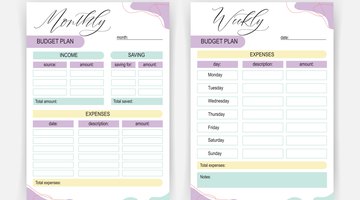A lot of the time, when you first go to college, you are financially independent for the first time. It can be easy to lose track of money when you’re out partying every night, eating out with friends, buying your own groceries and more. Keeping good track of your finances is a lesson that’ll help you for the rest of your life, and the longer you save your money, the more you’ll have in the future.
Firstly, start by getting a part time job. Having a part time job can help you have a steady income and responsibility outside of school. However, make sure you always put school first and foremost.
A lot of colleges have on campus jobs, whether it be helping out with student resources, dining hall’s, or residential life, colleges do not shy away from providing jobs to students.
Along with this, many colleges offer career services to aid students in getting jobs. Your college is there to help you, so use your resources wisely.
1. Budget Binder
A budget binder keeps all of your money visible to you in cash. With each envelope in the binder designated to a specific area of your life, you can budget your money in a way where everything is visible to you.
2. Create Your Budget
As a college student, I have had a lot of trial and error when it comes to making and upholding a specific budget. To get started on making yours, first, grab a piece of paper and write down your monthly income. Then, write down any phone subscriptions, bills, or payments that don’t change or vary monthly. Next, add your monthly payments of groceries, clothing, miscellaneous items, etc., to the list of payments. Add everything together, and then subtract your monthly income with your monthly payments. If you find that you are spending more money than you make, you may need to adjust some of your variable expenses. If you find yourself spending less than what you make, put the rest towards savings or an emergency fund.
3. Keep your receipts.
Keeping your receipts can help create your budget as well as lay out how much money you are spending.
4. Read personal finance books.
If you have never taken a personal finance course, there are a wide variety of books on how to budget your money wisely and efficiently.
- The Black Girl’s Guide To Financial Freedom: Build Wealth, Retire Early, and Live the Life of Your Dreams
- Get Good with Money: Ten Simple Steps to Becoming Financially Whole
- How to Manage Your Money When You Don't Have Any
- Broke Millennial: Stop Scraping By and Get Your Financial Life Together
- How to Adult: Personal Finance for the Real World
- Budget Management for Beginners: Proven Strategies to Revamp Business & Personal Finance Habits. Stop Living Paycheck to Paycheck, Get Out of Debt, and Save Money for Financial Freedom
5. Learn the 50/20/30 budget rule.
In the book, “All Your Worth: The Ultimate Lifetime Money Plan,” by Senator Elizabeth Warren, Warren lists a simple rule: the 50/20/30 rule. The rule is to divide after-tax income and allocate it to spend 50% on needs, 30% on wants, and 20% away for savings.
6. Invest in workbooks or worksheets.
If you struggle with organization, there are many personal finance worksheets to help you budget your money.
Related Articles
Writer Bio
I am a fall editorial assistant at Leaf Group! I am a sophomore at The University of Missouri, Columbia, majoring in journalism! I am mainly interested in political and/or investigative journalism when I graduate, but as of right now, I love just about any aspect of journalism!










